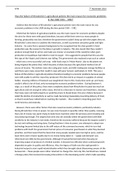Essay
Wasthe failure of Khrushchev's agricultural policies the main reason for economic problems in the USSR in ? AS History Pearson Edexcel
- Institution
- PEARSON (PEARSON)
Was the failure of Khrushchev's agricultural policies the main reason for economic problems in the USSR in ? AS History Pearson Edexcel. High achieving student answer. Checked by teachers. A/B grade.
[Show more]



